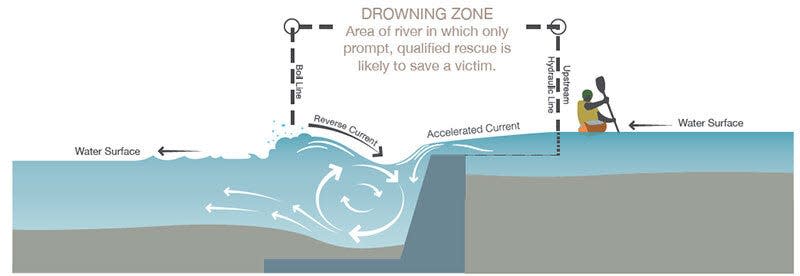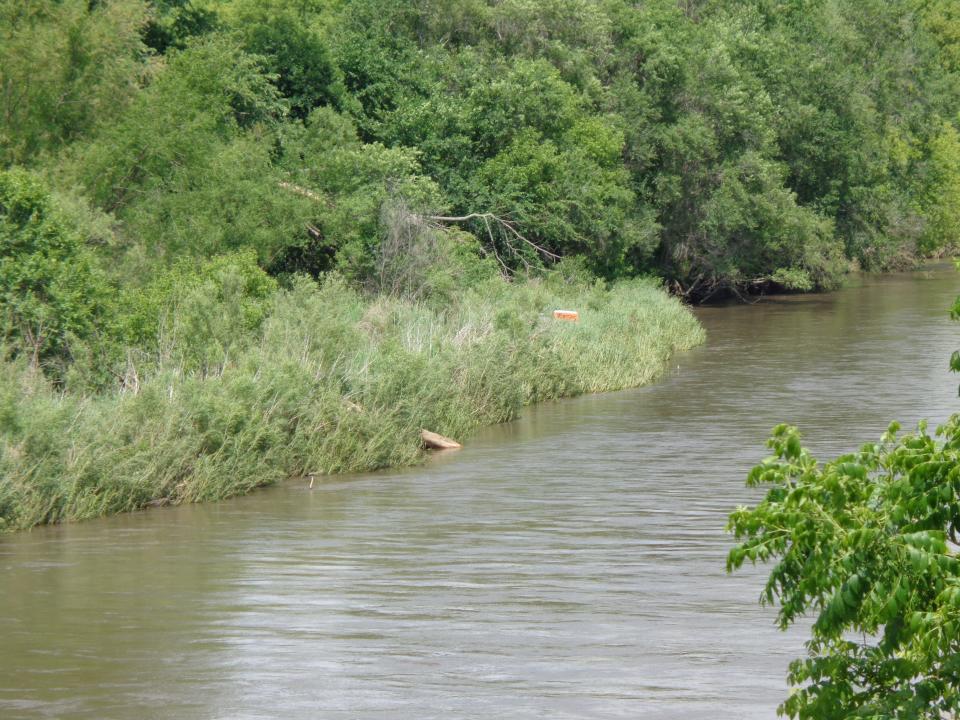Family sued after their loved ones drowned on an Iowa low-head dam. The court dismissed it
A lawsuit accusing officials of failure to mark a dangerous low-head dam is over, at least for now, after the court ruled the plaintiffs failed to meet the heightened requirements set by a 2021 state law.
Sharon Kahn, 64, and Vicki K. Hodges, 44, both of West Union, died in June 2020 while tubing on the Turkey River in Fayette County. The two women went over the top of the Clermont dam, became trapped in turbulence at the base of the structure, and drowned.
Family members of both women sued the city, county and state in 2022, claiming that despite the stretch of river being designated a state "water trail," inadequate safety equipment and signage upstream of the dam gave no warning to river users that they were approaching a hazard.
The Clermont Dam is of a type known as a "low-head dam," meaning water flows over the top of a long berm across the waterway. This makes such dams very hard to spot from upstream and creates powerful cyclical currents at their base, leading officials to call such dams "drowning machines." Several such dams are located in Des Moines, and after years of planning, work began this summer on the first of several projects meant to mitigate the danger they pose and create new watersports attractions.
In their lawsuit, the families alleged there were no warnings about the dam at the entry point of the water trail, and four of the five signs meant to warn boaters to disembark upstream were overgrown and concealed from view at the time of the women's deaths. The dam also lacked a suspended safety cable for boaters to grab before going over the edge, with one Iowa Department of Natural Resources official saying it had been destroyed in a flood years earlier and never replaced.
Lawsuit runs afoul of new pleading requirements

The families accused the state, county and city of negligence and premises liability, saying each played a role and had responsibilities for marketing the river as a water trail while failing to address the dam's obvious hazard.
The defendants moved to dismiss the case on several grounds. They argued that under the "public duty doctrine," they cannot be liable for alleged negligence in building and maintaining public works unless the plaintiff can show some "special relationship" between the government and the plaintiff that would create a greater duty than what the government owes to the public at large.
The government entities also argued the suit was blocked by Iowa's 2021 Back the Blue law, which created a qualified immunity defense for claims against government entities. The Iowa Supreme Court ruled earlier this year that defense does not apply to claims arising from alleged misconduct before the law was passed. But the law also introduced new requirements for what information must be included in petitions against the government, and the court ruled those procedural changes apply to all lawsuits filed after the law was passed.
Because the Hodges and Kahn families filed suit after the law was passed, they were required to meet the new heightened pleading standard — “that a plaintiff plead with particularity a plausible violation of the law” — or face dismissal, the defendants argued.

The court agreed. On Sept. 5, District Court Judge Laura Parrish dismissed all claims against the county and city, finding that both the public duty doctrine and the Back the Blue law pleading rules required her to dismiss the case. On Thursday, she filed a similar order dismissing the remaining claims against the state.
Attorneys for Clermont and Fayette County declined to comment, while the Iowa Attorney General's Office did not respond to a message seeking comment. An attorney for the families did not respond to a request for comment, but in court filings, the plaintiffs have indicated they intend to appeal the rulings.
The Clermont suit isn't the first to be tripped up over the Back the Blue law's requirements. A lawsuit by a man paralyzed by Waterloo police was dismissed, although the Supreme Court later revived it. More recently, a lawsuit challenging Polk County's action to rezone an agricultural property for a new headquarters for The Family Leader Foundation also was dismissed for failure to meet the new standards.
William Morris covers courts for the Des Moines Register. He can be contacted at wrmorris2@registermedia.com, 715-573-8166 or on Twitter at @DMRMorris.
This article originally appeared on Des Moines Register: Families' lawsuit over Clermont Dam drownings dismissed in Iowa courts

